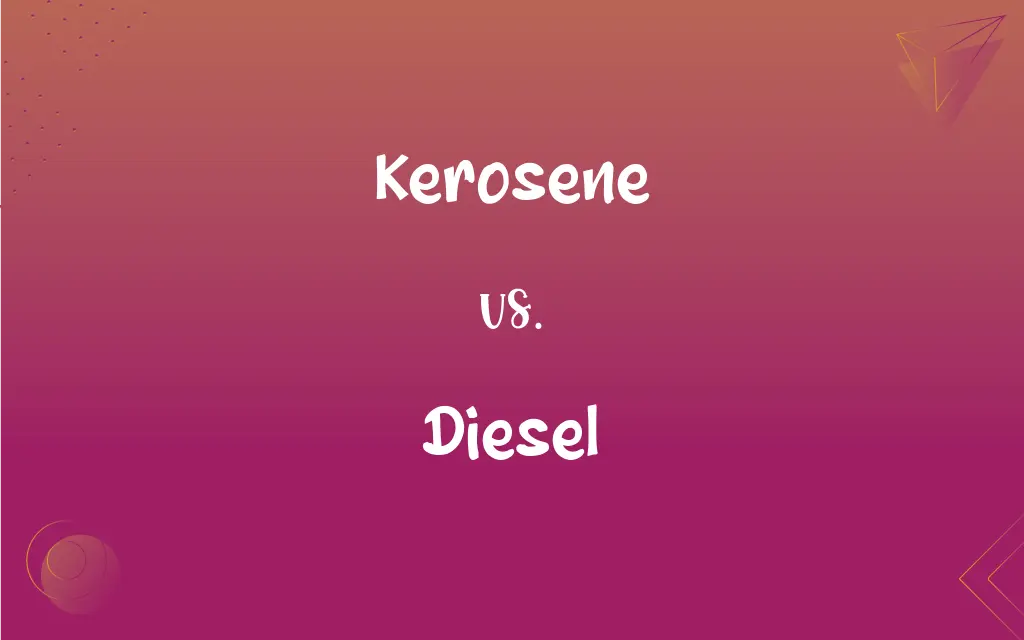Kerosene vs. Diesel: What's the Difference?
Edited by Aimie Carlson || By Janet White || Published on December 23, 2023
Kerosene is a lighter fuel oil used for heating and jet engines, while diesel is a heavier fuel used in engines for higher torque and efficiency.

Key Differences
Kerosene, a light petroleum distillate, is primarily used for heating, lighting, and jet fuel. Diesel, a denser fuel, is used for powering diesel engines, known for their efficiency and torque.
In terms of chemical composition, kerosene consists of hydrocarbons containing 12 to 15 carbon atoms per molecule. Diesel, on the other hand, is composed of hydrocarbons that have 16 to 20 carbon atoms per molecule, making it a heavier fuel.
Kerosene has a lower boiling point and less density compared to diesel, which contributes to its distinct uses such as in aviation and domestic heating. Diesel, with its higher boiling point and density, is optimized for use in diesel engines, providing higher energy per gallon.
The ignition properties differ: kerosene is typically ignited by a wick or a spark in jet engines, while diesel engines compress the fuel until it spontaneously ignites, needing no spark.
Safety and storage considerations for kerosene include its relatively lower flash point compared to diesel, necessitating careful handling. Diesel, while less volatile, still requires proper storage to prevent contamination and degradation.
ADVERTISEMENT
Comparison Chart
Primary Use
Heating, lighting, jet engines
Diesel engines for vehicles
Chemical Composition
C12-C15 hydrocarbons
C16-C20 hydrocarbons
Boiling Point and Density
Lower boiling point, less dense
Higher boiling point, more dense
Ignition Properties
Ignited by wick or spark
Self-ignites under high pressure
Safety and Storage
Lower flash point, volatile
Less volatile, prone to contamination
ADVERTISEMENT
Kerosene and Diesel Definitions
Kerosene
Kerosene is used in lamps and stoves in areas without electricity.
They used a kerosene stove for cooking during the power outage.
Diesel
Diesel is produced from the fractional distillation of crude oil.
The refinery increased its diesel production to meet demand.
Kerosene
Kerosene is derived from refining petroleum.
The refinery produces kerosene along with other petroleum products.
Diesel
Diesel fuel offers high energy efficiency for transportation.
Many buses use diesel due to its efficiency and low-cost maintenance.
Kerosene
Kerosene is a combustible hydrocarbon liquid used as fuel.
The lantern was filled with kerosene to provide light.
Diesel
Diesel is a heavy fuel oil used in diesel engines.
The truck's diesel engine was known for its reliability and power.
Kerosene
Kerosene is used as jet fuel due to its high energy output.
Commercial jets are often powered by kerosene-based fuels.
Diesel
Diesel is used in generators for electricity production.
During the blackout, the diesel generator provided essential power.
Kerosene
Kerosene is a heating oil for domestic and industrial use.
The furnace uses kerosene to heat the warehouse.
Diesel
Diesel engines are known for their high torque output.
The diesel-powered tractor easily towed the heavy load.
Kerosene
A thin oil distilled from petroleum or shale oil, used as a fuel for heating and cooking, in lamps, and as a denaturant for alcohol. Also called coal oil.
Diesel
A diesel engine.
Kerosene
A thin colorless to straw-colored petroleum-based fuel heavier than gasoline/petrol or naptha but lighter than diesel, used primarily as jet fuel but also for heating and lighting in some remote or impoverished areas.
The kerosene lasted all winter, so the furnace kept us always warm.
Diesel
A vehicle powered by a diesel engine.
Kerosene
An oil used for illuminating purposes, formerly obtained from the distillation of mineral wax, bituminous shale, etc., and hence called also coal oil. It is now produced in immense quantities, chiefly by the distillation and purification of petroleum. It consists chiefly of several hydrocarbons of the methane series, having from 10 to 16 carbon atoms in each molecule, and having a higher boiling point (175 - 325° C) than gasoline or the petroleum ethers, and a lower boling point than the oils.
Kerosene
A flammable hydrocarbon oil used as fuel in lamps and heaters
FAQs
What are the main uses of kerosene?
Kerosene is used for heating, in kerosene lamps, and as jet fuel.
How is kerosene produced?
Kerosene is produced by refining crude oil, specifically through distillation.
Is kerosene safe for indoor use?
Kerosene can be used indoors with proper ventilation, as it emits harmful fumes.
What is the energy content of diesel fuel?
Diesel has a higher energy content per gallon compared to gasoline and kerosene.
What is diesel?
Diesel is a heavy petroleum distillate used primarily in diesel engines.
Can kerosene be used in diesel engines?
Kerosene can be used in diesel engines with modifications, but it's not typical.
What is kerosene?
Kerosene is a light petroleum distillate used as fuel in heating, lighting, and aviation.
What are diesel engines?
Diesel engines are internal combustion engines that use diesel fuel for higher efficiency and torque.
How does diesel fuel impact the environment?
Diesel fuel can contribute to air pollution but is often less so than gasoline.
Are diesel engines more efficient than gasoline engines?
Yes, diesel engines are generally more efficient and provide more torque than gasoline engines.
What are the disadvantages of diesel engines?
Diesel engines can be noisier and produce more particulate emissions than gasoline engines.
How is diesel fuel produced?
Diesel is obtained from the fractional distillation of crude oil.
What is the flash point of kerosene?
Kerosene has a lower flash point than diesel, making it more flammable.
Is diesel fuel biodegradable?
Diesel is not readily biodegradable and can be harmful to the environment if spilled.
Can kerosene lamps be used for emergency lighting?
Yes, kerosene lamps are often used for emergency lighting.
Are there alternative fuels to diesel for engines?
Yes, alternatives include biodiesel, natural gas, and electricity.
How is kerosene stored safely?
Kerosene should be stored in well-ventilated areas and in approved containers.
How does diesel fuel affect engine longevity?
Diesel engines often have a longer lifespan due to their robust construction.
Is kerosene more expensive than diesel?
The price of kerosene and diesel varies, but kerosene is often more expensive due to its uses in aviation.
Is kerosene used in cold climates?
Yes, kerosene is often used for heating in cold climates.
About Author
Written by
Janet WhiteJanet White has been an esteemed writer and blogger for Difference Wiki. Holding a Master's degree in Science and Medical Journalism from the prestigious Boston University, she has consistently demonstrated her expertise and passion for her field. When she's not immersed in her work, Janet relishes her time exercising, delving into a good book, and cherishing moments with friends and family.
Edited by
Aimie CarlsonAimie Carlson, holding a master's degree in English literature, is a fervent English language enthusiast. She lends her writing talents to Difference Wiki, a prominent website that specializes in comparisons, offering readers insightful analyses that both captivate and inform.































































